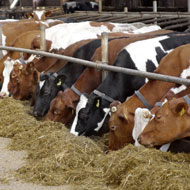Contaminated feed ‘most likely source’ of BSE infection

EFSA concluded that contaminated feed is the most likely source of infection
Food safety experts have confirmed that exposure to feed contaminated with bovine spongiform encephalopathy (BSE) is the most likely reason why isolated cases of the disease are still being reported in the EU.
Between 2005 and 2015, some 73 million cattle were tested for BSE in the EU, of which 1,259 tested positive for classical BSE. Of these, 60 were born after 2001, when the EU implemented a ban on the use of animal proteins in livestock feed.
The European Commission asked the European Food Standards Agency (EFSA) to investigate the origin of these cases to see if they were caused by contaminated feed, or whether they occurred spontaneously.
EFSA concluded that contaminated feed is the most likely source of infection, because the infectious agent that causes BSE has the ability to remain active for many years.
“Cattle may have been exposed to contaminated feed because the BSE infectious agent as present where feed was stored or handled,” it said in a statement. “A second possibility is that contaminated feed ingredients may have been imported from non-EU countries.”
Due the the difficulty of investigating individual cases, experts could not rule out other causes. Some constraints are the long incubation period of the disease and the lack of detailed information from farms at the time of the investigation.
In its report, EFSA makes a series of recommendations to maintain and strengthen the EU monitoring and reporting system, and to evaluate new scientific data that become available.
It notes that the number of classical BSE cases has dropped significantly in the EU over time, from 554 cases reported in 2005 to just two in 2015 (born after the ban).



 RCVS Knowledge has welcomed Professor Peter Cockcroft as editor-in-chief for Veterinary Evidence.
RCVS Knowledge has welcomed Professor Peter Cockcroft as editor-in-chief for Veterinary Evidence.